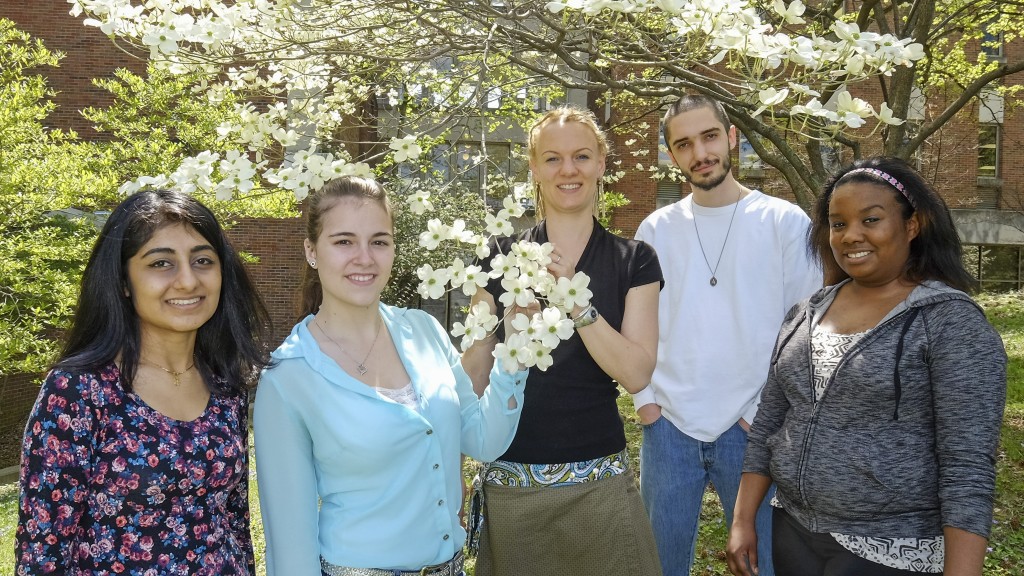
A team of researchers from UMSL are looking to study people in love. Leading the project to study how being in love affects cognition are (from left) Kruti Surti, Amanda Lococo, Assistant Professor of Psychology Sandra Langeslag, Remy Mallett and Kaylyn Moore. (Photo by August Jennewein)
Spring is closely associated with love and romance. As the weather warms and flowers bloom, there are fewer layers of clothing, and birds, bees and humans start to pair off.
This is also time for Sandra Langeslag and her students to study love and infatuation and how it affects our brains. Langeslag, assistant professor of psychology at the University of Missouri–St. Louis, is overseeing several studies that are looking for participants who are infatuated with their partner or just a crush.
Many people have been in love or at least have had a major crush on another person, but there is little research that explains what love is and how it affects us, Langeslag said. She started researching the topic as an undergraduate with a broken heart, striving to understand why she felt the way she did.
“I would look into the literature and found out there was hardly any scientific research about love,” she said. “If you look at Cosmopolitan, you read all these articles that make it seem like we know exactly what’s going on but we don’t. That’s when I thought I needed to study this and get actual scientific answers.”
Langeslag’s earlier research showed that being in love helped improve a person’s memory and level of attention, but only for their beloved or things that were related to that person. The amount of time that people devoted to thinking about their love meant that it crowded out their ability to do other things.
People in the infatuation stage of a relationship, usually the first few months, spend most of their days thinking about their main squeeze. On average, participants thought about their sweetie 65 percent of the time, with the top score being 93 percent, Langeslag found previously.
“These people in love think about their love all day and it comes at a cost,” Langeslag said.
Langeslag’s new research will consider what that cost is by determining how love affects cognition and memory, exactly what butterflies in the stomach are and the regulation of emotions. Her team consists of students Amanda Lococo, Remy Mallett, Kaylyn Moore and Kruti Surti.
Moore and Surti will consider how infatuation affects memory and attention, respectively. Participants will be given a neutral task while being shown pictures of the object of their affections as a distraction. Moore and Surti will measure their memory and attention levels in separate studies.
Participants in Lococo’s study will consider the phenomenon known as “butterflies in the stomach.” Participants will be hooked to electrodes to determine what their stomach muscles are doing when they see pictures of the one they cherish.
Mallett’s study doesn’t actually require people to be infatuated, but the results have implications for when relationships turn sour. The junior psychology major will be examining how participants regulate their emotions when exposed to certain stimuli. By regulating emotions, those unlucky in love might be able to get off the couch faster than those who do not.
“If you’re hurting over something, maybe can you down-regulate that hurt by focusing on something in particular,” Mallett said. “Or if you have a waning relationship and it’s something you want to keep solid, there could be ways to increase feelings of love.”
To participate in the research, volunteers must be between the ages of 18 and 40, and must have been in love for nine months or less. They don’t need to be in a couple. An unrequited crush also counts. All results of individual participants will remain confidential.
To participate, email nemlabpsychology@umsl.edu.















